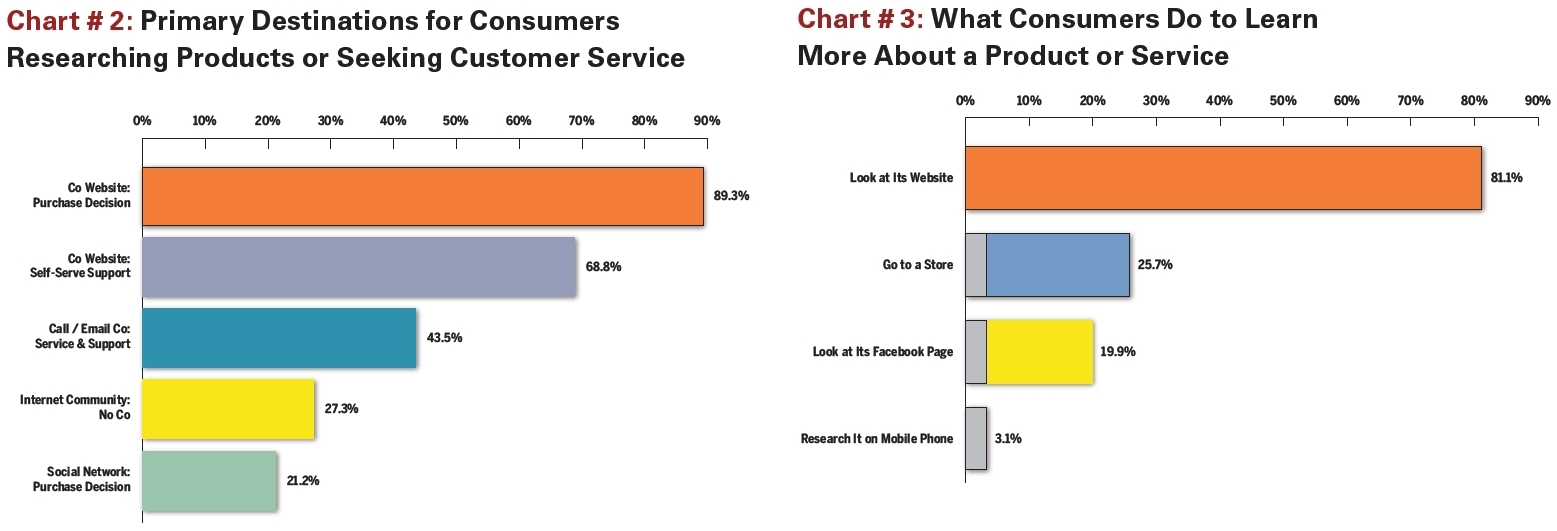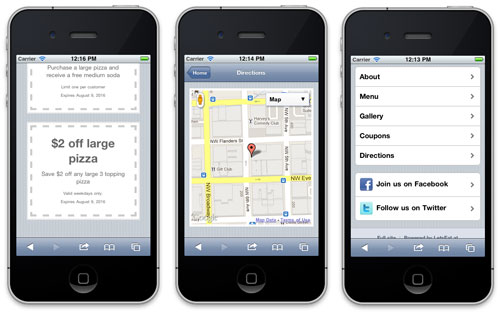- Menu
According to a survey by AIS Media, 89% of consumers have researched
a restaurant online before dining there — 57% indicated that
prior to selecting a restaurant, they view the restaurant's website,
and 33% view fellow consumer reviews online.
Why Restaurants Need a Website
In spite of our current economy, Americans spent $632 billion dining out last year according to the National Restaurant Association.
According to a survey Google reported in their article "Online Role of Restaurant Researchers", 90% of diners go online for information about restaurants, and 70% use the internet to decide which restaurant to visit. From reviews to directions to nutritional info, consumers are turning to the internet to become informed prior to purchase, with 83% of people using Search for their restaurant related activities. The survey also found that in terms of promotions, online is more powerful than outdoor and radio ads, and equal to direct mail.
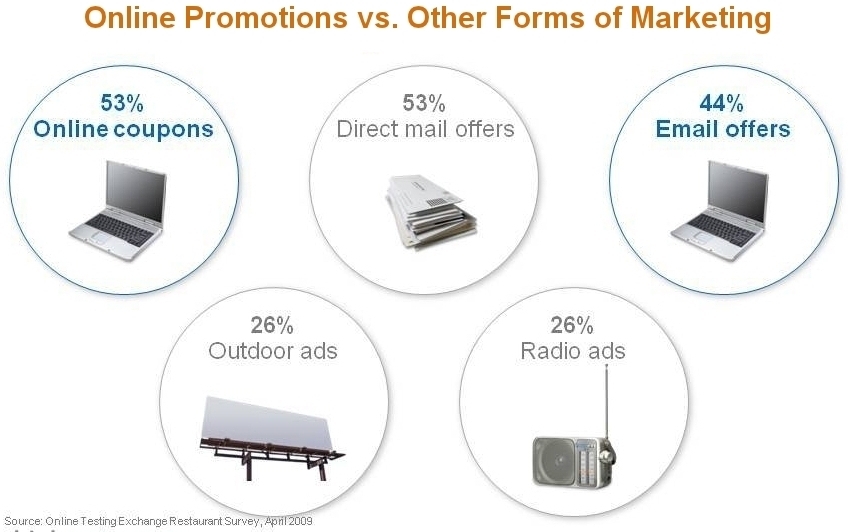
Lack of web presence in today’s digital world has extended negative consequences, not only from the point of view of not attracting consumers searching online but, in addition, many online sites, including location-based services (i.e. FourSquares), social media and menu aggregators (i.e. Menuism.com or Just-Eat), use an existing website to gather and pass along information they find. Restaurants without a web presence are not able to benefit from this free online amplification.
Online search can be a cost effective way to create awareness for a restaurant, but most restaurants are not taking advantage of the Google Places or Bing Local listings created by Google and Microsoft for restaurants and bars. Consumers, however, are way ahead of restaurant owners in utilizing these sites, and often post restaurant reviews.
Restaurants are some of the most searched types of businesses in Local. Because of this, Google and other search engines typically look for some specific content for rankings, and the number one type of content sought on websites is the menu. Menus are so important for restaurants, they should be optimized so that search engines may spider them and use their content beneficially for ranking.
Watch Foodie Network will build you a website with a menu that is not only search engine optimized (SEO) and mobile friendly, but is formatted for a clean printout. Your menu will easily integrate with Facebook so you can show your menu as a tab on your Facebook page, allowing you to update it instantly from your website. You also have the option to add photos to each menu item or just a select few.
Can a Facebook Page Replace a Website?
Although in an attempt to save money some restaurants do use their Facebook Business Page as their website, it’s not a smart long-term solution for several key reasons.
-
Limited Exposure
The simple truth of the matter is not all potential customers are on Facebook, nor want to be because of privacy related issues, as covered in a recent CNBC video report "The Facebook Obsession".
-
Facebook Owns It
A business doesn't really own its Facebook Business Page. Since you don't pay for your Facebook Business Page, you're essentially little more than a "squatter" in a social media mall. This places your business in a precarious position: You're at Facebook's mercy.
As the well-known proverb goes, "Man plans, Mark Zuckerberg laughs", which means Facebook can make any changes they want to the layout, design and overall look and feel of their Pages. They've already done this several times, often without warning to anyone, and there’s nothing to stop them from making a change that hurts your business.
-
Limited Flexibility
A Facebook Page doesn’t provide the total flexibility of a website. A Facebook Page has inherent limitations, and businesses have far less ability to create unique experiences on Facebook. Content is a huge and resource-heavy aspect of web-based marketing. When you go through the process of buying your own domain, setting up your site and ultimately publishing your content, it’s yours. You own it, which means you decide what goes on the page, where and why. You can design a website any way you like, putting information/pictures in the right places, and include a very prominent contact form and phone number to help potential customers get in touch. You can also make any changes when you want, update it and enhance it. Plus there are no distractions, such as the notifications and ads that are ever-present in the Facebook interface.
-
Missed SEO Opportunities
Google has changed their Local Search algorithm, increasing the importance of having a website for ranking in Local Search. The results from a survey Google reported in their recent article "Online Role of Restaurant Researchers", showed that 83% of people use search for their restaurant related activities. Search is clearly a major prospective source of potential new clients, so you need your own website with control of your SEO. There are numerous benefits of having your own website. When you have your own website, you're in control of how you'll get found online. That means you can have your site optimized to show in search engine listings for the keywords you want to rank for.
A Facebook Page is a searchable property for your business, but you have no control over how highly it ranks on Google, or any of the other search engines, because you can’t use the same SEO tools and tactics you would on a normal website. By not allowing you to influence so many of the factors that go into search engine page ranking, Facebook is taking you out of a potentially large market of prospective clients.
-
Facebook Ads
Facebook places advertising in the right sidebar on your Page. If your competition is advertising, it's entirely possible, if not likely, that their ads will appear directly opposite your own content. Do you really want your only home on the web to be pushing other products alongside your own? You need one place on the web that is all your own. A website is an excellent and cost-effective way of achieving that.
-
Customers Still Prefer Websites
Social networks are not the first place people go to research products and services. Google and business (i.e. restaurant) websites are.
According to a recent study conducted by The Incyte Group, which polled 1,897 qualified consumers who actively use the Internet and represent adults from all age, socio-economic and geographic groups in the U.S., when people log onto social networks such as Facebook, 70.2% of them do so for social networking, but only 12.8% said they visit social media to research brands (i.e. restaurants) and product (i.e. menu) details. When customers wanted information to make a purchasing decision, 89.3% went straight to the company’s own website; 21.2% used a social network. The study found that 81.1% of customers who wanted to learn more about a product were more likely to visit the company’s website than their Facebook Business Page (19.9%). However, 64.5% of customers reported they would like to be introduced to companies through friends’ Facebook posts, which should be of no surprise given the importance of word-of-mouth referrals.
This new data validates that consumers do not expect to find detailed information about products and services on open social networks. Rather, these sites are where people are more likely to discover them through a friend.
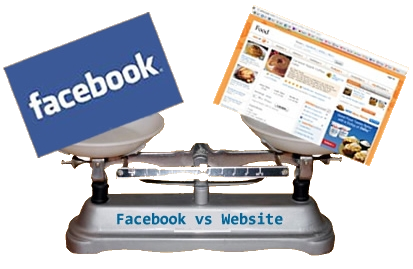
There are a lot of reasons to create a Facebook Page – and your business almost definitely should. But to think that this removes the need for a website is a mistake. The best option is to use both a business website and social media.
Watch Foodie Network will not only build a website to your specifications, with the layout and overall look and feel you desire, but you'll own it. Plus, we'll incorporate the SEO tools and current best practices needed for your website to show in search engine listings for the keywords you want to rank for. We'll link your website to any or all of your social media accounts, such as Facebook, Twitter, YouTube, Foursquares, Yelp, or Urbanspoon.
Why Restaurants Need a Mobile-Optimized Website
According to a recent report by Google titled "Understanding the Mobile Consumer", by 2013, more people will use their mobile phones than PCs to get online, and mobile searches have already grown 4 times since 2010.
Mobile Users More Frequently Become Actual Customers
A recent "Mobile Path-to-Purchase" study conducted by Nielsen, is the industry's first to not only measure what consumers report they are doing via mobile devices, but also capture their actual preferences and behaviors. The results are based on data from an online survey of 1,500 U.S. smartphone and tablet users and actual observed consumer behaviors from Nielsen’s Smartphone Analytics Panel of 6,000 Apple and Android users.
They found that tablet owners (72%) mostly use their device while they are in their home, while smartphone users (68%) mostly use their device “on the go”. The study also found that:
- mobile Restaurant seekers have a strong sense of immediacy, with 64% of smartphone and 44% of tablet users making a decision within an hour of their search,
- 89% of smartphone owners and 84% of tablet users take action within 24 hours of their search,
- 85% of mobile Restaurant seekers (nearly 9 in 10) go on to complete a purchase—that's a 85% conversion rate!
This landmark study clearly demonstrates that overall mobile purchase intent is strong. If nothing else resonates, this study reinforces the notion that smartphone and tablet users are much more “ready to buy” than their PC counterparts.
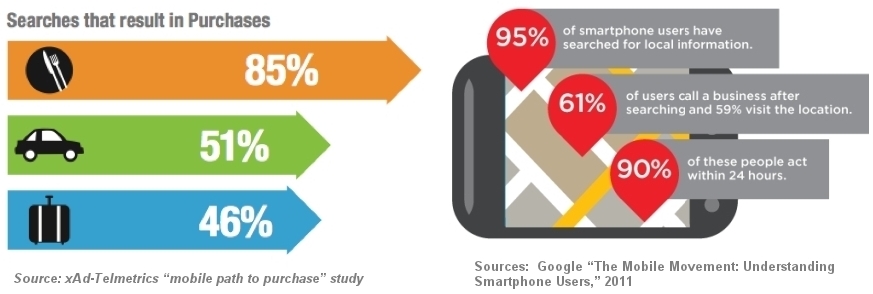
Google reported similar findings in their "The Mobile Movement: Understanding Smartphone Users". Nearly 9 in 10 (89%) smartphone users take action within 24 hours as a result of a smartphone search: 36% take immediate action, 39% within a few hours, and 14% within a day. A variety of actions are taken after a mobile search: 54% visit the website of a business, 61% call the business, 58% look up the business on a map or get directions, and 59% physically visit the location.
A Bad Mobile Experience Is Costly!
According to the recent "Restaurant Internet Marketing Study" by Restaurant Science (a restaurant industry information and analytics provider), only 1 out of 8 full service restaurant chains and 1 out of 20 independent restaurants have a mobile-friendly website. What makes this even worse is according to some reports, 51% of all visits to restaurant websites are from mobile devices, including iPhones, Android-based handsets and Blackberry phones.
Customers use these devices to check hours, address information and phone numbers. But what most users really want from a restaurant's website is to look at their menu. According to Restaurant Science, though, fewer than 40% of independent restaurants actually display their menus on their website.
A bad mobile experience can cost you customers, according to the article "What Users Want from Mobile" by Compuware. They reported that 57% of mobile phone users would not recommend a business with a bad mobile site. Another 40% of users said they have turned to a competitor's site after a bad mobile experience.
With Americans spending $632 billion dining out last year, according to the National Restaurant Association, restaurants that still rely on Flash-based websites and websites that are not mobile friendly are missing out on thousands of dollars in potential revenue from customers each month!

Watch Foodie Network will build you a website that is automatically optimized for mobile devices and is easy to navigate. It will prominently display your business hours, address and contact information, whether or not you accept credit cards and which ones, any online coupons you may offer, and your full menu.
What Customers Want on Your Website
If your website doesn’t contain the information that consumers want, it’s not going to help you gain them as patrons. So what do you include on your site?
A nationwide poll of 2,517 consumers conducted by AIS Media showed that 89% of consumers have researched a restaurant online prior to visiting a restaurant; 57% said they check out the restaurant’s website itself. The poll found that 32% of respondents considered directions with mapping capability as being most important on a restaurant's website. That was followed by 28% who viewed a menu selection with pricing important, and 24% seeking general restaurant information, such as hours of operation, parking and contact information.
As consumers become savvier in researching restaurants, the poll found that 33% of respondents seek out consumer reviews online and base their restaurant selections on the ratings of fellow consumers; 29% of respondents based their decisions on newspaper reviews.
Your website should also explain why your restaurant is the place to be, include any Happy Hour info, showcase any specials (including social promotions such as Foursquare, Groupon and Twitter specials), and be easy to navigate.
Last, but not least, customers want to you to offer coupons, especially the moms. Eating out and ordering in is a necessity for moms and they spend more than non-moms ($51 compared to $35). According to a survey Google reported in their "What Makes Mom Click for Restaurants", moms buy from fast food restaurants more often than beauty, cleaning, or baby products. The survey found that moms use the internet as their "go-to" source for restaurant information, consulting the internet about their restaurant decisions before consulting their spouse or kids. Moreover, moms search for restaurants while on the go; 59% of moms have conducted a restaurant related search on their mobile phone.
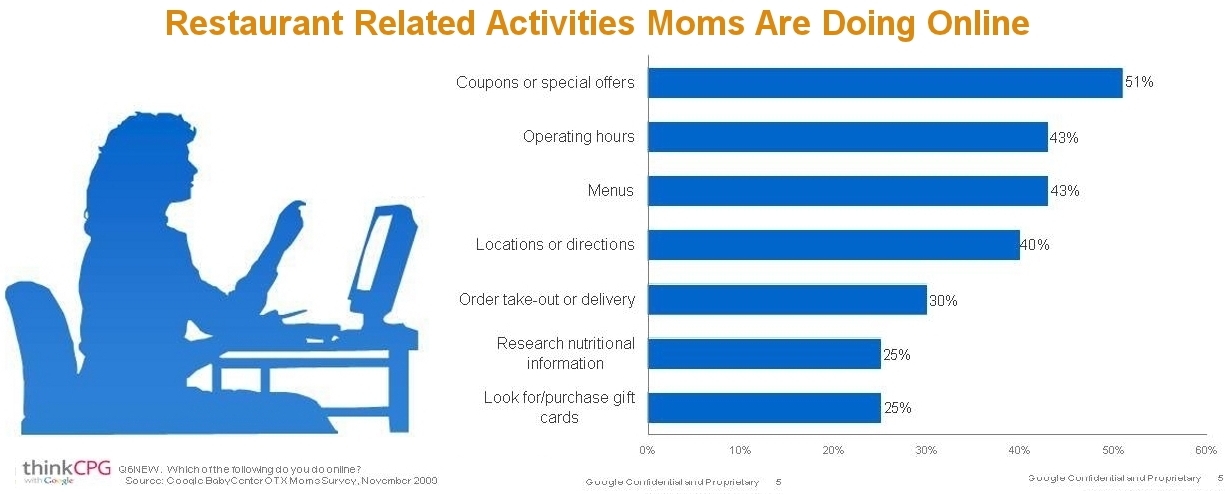
Watch Foodie Network will help you boost sales and lure in new customers and regulars with limited time coupons and discounts. Save on advertising costs by creating your own printable, customizable web coupons. We can do it for you or show you how to do it yourself with the easy-to-use coupon generator that comes with your website.
Online Ordering & Reservations
Speed and convenience are two of the primary motivators when it comes to choosing a restaurant, whether dining in or dining out.
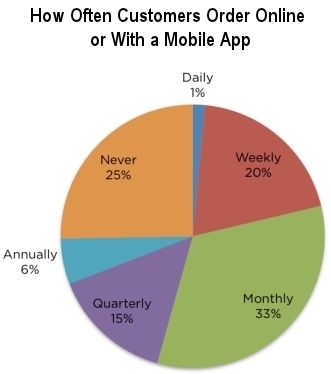
Let’s face it. Today’s world is fast paced. Who has time to call and place an order or make reservations when it can be done with the click of a mouse? Your website should allow your customers to do these things online and free up your employees. Instead of answering phones all day, employees can concentrate on face-to-face customer service to your patrons.
Why Offer Online Ordering?
According to a recent report by Splick-it titled "Mobile and Online Ordering Usage Trends" in which they surveyed 7,122 consumers nationwide, ordering online, by phone and by mobile app are all done with similar frequency. However 71% of their respondents reported ordering online sometimes or often, and 54% ordered online or with an mobile app daily, weekly or monthly.
When asked why they use online or mobile ordering and payments:
- 73% said because they can place their order more quickly
- 52% said because they don't like waiting in line
- 38% said because it makes it easy to order for groups
- 21% said because it's easier to redeem coupons and promotions.
Additionally, the survey found that order sizes increase by an average of 2-4% with online or mobile ordering and payments.
The bottom line is online ordering consistently increases ticket size, order volume, and customer loyalty.
Why Offer Online Reservations?
According to a restaurant industry study from Cornell's Center for Hospitality Research, restaurant customers like the convenience of the internet, but they appreciate the personal touch of telephone reservations. In their report, titled "How Restaurant Customers View Online Reservations", the study found that while restaurant customers who make online reservations do not vary significantly by gender, they tend to be relatively young, frequent diners. The respondents said that online reservations were convenient, but at the same time, they did not want to give up entirely on the personal connection with the restaurant that is only possible with a phone call.
However, according to the white paper "Restaurateur’s Guide to Front-of-House Solutions" by OpenTable, research shows that 40% of potential customers hang up and call another restaurant when they reach a voicemail message or are put on hold. The white paper discusses numerous other advantages to offering your customers the option to make online reservations, including:
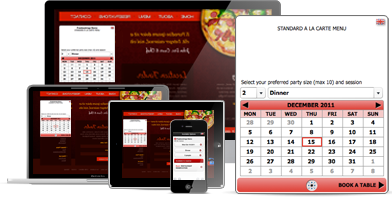
-
Reduce risk of inaccurate or lost reservations associated with pen-and-paper based reservations.
-
Capture more reservations and free up resources.
-
Coordinate guest data across sister properties.
-
Use reservation slotting to broaden peak capacity periods.
-
Accurately manage the waitlist and keep customers satisfied.
-
Meet customers’ needs for convenient booking by allowing them to see availability and select their optimal timeslot.
-
Reduce no-shows with automated email reminders and stored credit cards to guarantee reservations.
-
Keep more seats filled, more of the time. (Research shows that restaurants can serve up to 30% more customers and increase revenues during peak periods by nearly 15% by managing their table configuration wisely.)
-
Monitor meal duration and turn more tables. (A two-and-a-half minute reduction in total turn time has been shown to result in a 5% increase in top-line sales.)
-
Empower employees to anticipate guests’ needs. (Research shows that repeat customers tend to spend more money than first-time guests. The ability to store and search historical guest data enables you to extend great service even to infrequent guests so that you can convert them into more frequent patrons.)
-
Build and leverage your database for targeted email campaigns. (When a customer makes a reservation online, you're able to capture their name, email address, and phone number.)
-
Use email to promote special events and foster loyalty. (Email marketing is a low-cost, effective way to make sure your restaurant is top-of-mind when a customer is deciding where to dine. A recent study found that restaurant email campaigns tend to outperform other types of email marketing, signaling that diners enjoy receiving email from their favorite restaurants. In fact, restaurant mailings had an average clickthrough rate of nearly 60%.)
Watch Foodie Network can build you a website that makes it simple and affordable to take online, mobile and social orders, and to book reservations from your website without paying cover fees. Let guests wait online – not in line. They'll see wait times from your website or their phone and join the list from anywhere.
Contact Us | Shop | Sitemap | Join Our Team | Investors | Advertise | Web Design Services
Community | Foodies' Choice | Meetup Groups | Chat | Blogs | Forums | Submit Your Site | Resources

